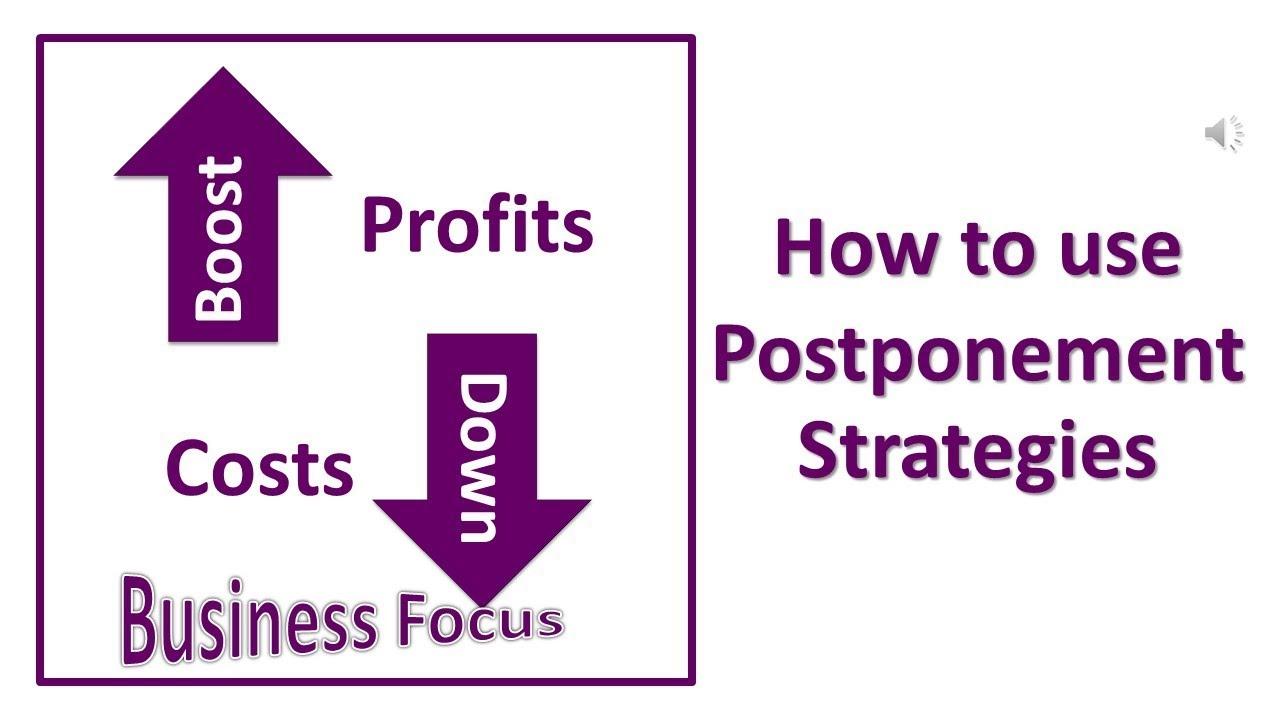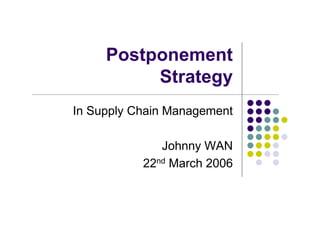In the ever-evolving world of logistics, adaptation is key to staying ahead of the curve. One strategy that has gained traction in recent years is the concept of postponement logistics. By strategically delaying key decisions in the transport and shipping process, businesses can optimize their operations to better meet the dynamic demands of the market. From reducing lead times to improving supply chain flexibility, postponement logistics offers an innovative solution for navigating the complexities of modern commerce. Join us as we explore the ins and outs of this cutting-edge approach and its implications for the future of transportation and shipping.
Understanding the Impact of Postponement Strategies on Logistics Efficiency
In today’s fast-paced world, efficient logistics play a crucial role in the success of any business. Postponement strategies have become increasingly popular in the industry as companies strive to streamline their operations and reduce costs. By delaying the customization of products until the last possible moment, businesses can respond more effectively to changing market demands and reduce inventory levels. This approach not only improves flexibility but also enhances overall logistics efficiency.
Postponement strategies impact various aspects of the supply chain, including transport and shipping. By implementing these strategies, companies can optimize their transportation routes, reduce lead times, and minimize the risk of overstocking. This results in cost savings and improved customer satisfaction. Ultimately, understanding the impact of postponement on logistics efficiency is essential for businesses looking to stay competitive in today’s dynamic marketplace.

Enhancing Transport Operations through Postponement Logistics
Postponement logistics is a strategic approach that allows companies to delay final product customization until closer to the time of sale or delivery. By implementing postponement logistics in the transport and shipping operations, companies can increase efficiency, reduce costs, and enhance customer satisfaction. This approach involves holding generic products in a central location and customizing them based on specific customer requirements just before they are shipped, allowing for greater flexibility and responsiveness to changing market demands.
By leveraging postponement logistics in the transport industry, companies can streamline their operations and improve overall supply chain effectiveness. Postponement strategies can help reduce the risk of overproduction, minimize inventory levels, and optimize transportation routes. This innovative approach can also lead to faster delivery times, increased product customization options, and improved overall customer experience.

Optimizing Shipping Processes with Postponement Techniques
Utilizing postponement techniques in shipping processes can greatly optimize logistics operations, leading to cost savings and increased efficiency. By delaying the final configuration of products until closer to the destination, companies can reduce excess inventory and the risk of obsolescence. This strategy allows for greater customization and flexibility in responding to customer demands, resulting in improved customer satisfaction.
Postponement logistics involves strategically positioning inventory closer to end customers, reducing lead times and transportation costs. By implementing this approach, companies can better manage their supply chain, minimize disruptions, and improve overall performance. With the use of advanced technology and data analytics, businesses can streamline their shipping processes and achieve a competitive edge in the market.

Key Recommendations for Implementing Postponement Strategies in Supply Chain Operations
When implementing postponement strategies in supply chain operations, there are several key recommendations that can help optimize processes and maximize efficiency. One important aspect to consider is the identification of key touchpoints in the supply chain where postponement can be effectively applied. By pinpointing these strategic locations, companies can better tailor their products to meet specific customer demands, resulting in reduced lead times and increased customer satisfaction.
Another crucial recommendation is the utilization of advanced technology and data analytics to streamline operations and enhance visibility throughout the supply chain. By leveraging tools such as real-time tracking and inventory management systems, companies can gain valuable insights into their processes and make data-driven decisions to improve overall efficiency and reduce costs. Additionally, fostering strong partnerships with suppliers and logistics providers is essential for successful implementation of postponement strategies, as collaboration and communication are key to achieving seamless coordination and timely delivery of products.
Future Outlook
In conclusion, the art of postponement logistics is a delicate dance of timing, efficiency, and flexibility in the world of transportation and shipping. By strategically delaying certain decisions or actions until the last possible moment, businesses can optimize their supply chains and adapt to unforeseen circumstances. As technology continues to advance and consumer demands evolve, mastering the intricacies of postponement logistics will be crucial for staying competitive in the ever-changing landscape of the industry. So embrace the uncertainty, embrace the delay, and let postponement logistics guide your journey to success in the world of transport and shipping.
